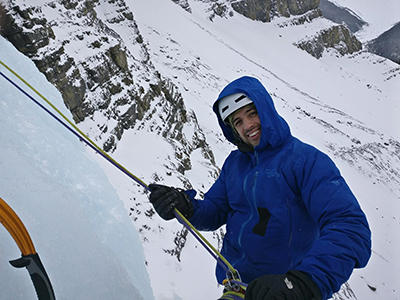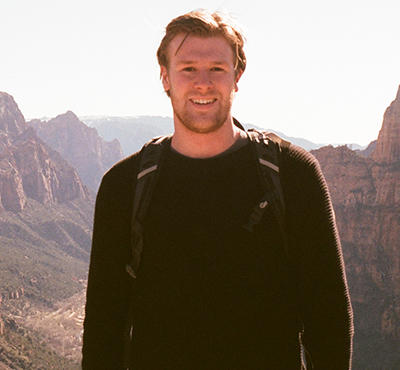April 20, 2017
Students bring legal help, and legal health, to vulnerable Calgarians

Greg Whiteside is a second-year University of Calgary law student.
Greg Whiteside has a huge grin on his face and a sparkle in his eye. The second-year law student is talking about a project he helped launch with Student Legal Assistance (SLA) and the Calgary Urban Project Society (CUPS) a little more than two years ago.
“It’s the first of its kind in Western Canada, but the model is quite popular in the U.S.,” says Whiteside about the Health-Justice Partnership between the organizations, which received funding from the Canada Summer Jobs program with the assistance of Kent Hehr, LLB’01, Member of Parliament for Calgary Centre and Minister of Veterans Affairs. “Medical-legal partnerships exist in some hospitals in the U.S., but there isn’t anything similar here. It’s really an emerging field in North America.”
“All Canadians — no matter their means — should have the right to a fair trial and access to a modern, efficient justice system,” says Hehr. “Last year we committed an additional $88 million over five years for legal aid funding partnerships with the provinces, and also put in a further $30 million per year in ongoing funding. While Canada Summer Jobs is a separate pool of funds from our work on legal aid, our commitment to access to justice is a value that I and this government hold dear and continues through into programs just like these.”
Aligning with CUPS’ mission to help people “overcome the challenges of poverty and attain brighter futures,” the Health-Justice partnership brings legal help, and legal health, to help clients address all issues of poverty and the underlying concerns, and looks at the person as a whole when creating and implementing a healing and recovery plan.
As Whiteside points out, giving clients the legal avenues to ensure child support gets paid, or bylaw tickets are dropped, helps them address their more immediate issues, such as finding a place to live, dealing with medical issues, or getting childcare so they can work.
“We’ve learned that our clients have so much to deal with. Legal problems are never a priority, creating a vicious cycle that becomes difficult to escape. The services provided by CUPS fall in to a state of instability when the client is unable to pursue legal avenues for other issues. We’re hoping to end that.”
Database improves visibility of information across CUPS departments
Whiteside launched the project in 2016 with friend and undergraduate student Alex Van Olm, who is the technical guru behind the project. Van Olm is responsible for integrating legal services with the CUPS database. It gives practitioners in the housing and education departments at CUPS access to all the information about a client, and refers them to the appropriate people, including Whiteside. The database allows easy access to information that will help all service providers understand a patient’s legal situation and how this may affect any medical, housing or family programming developed on the patient’s behalf.
“I saw people in triage while working at the Rockyview Hospital who had been arrested and were brought in by the police to get medical attention,” says Van Olm. “I knew there had to be a link to help people in similar situations, so I began researching medical-legal partnerships, and created a research proposal to incorporate the idea at SLA.”
Van Olm was responsible for writing a research proposal and securing ethics approvals — for both the university and CUPS — for the project, which examines health provisions and health outcomes. He and Whiteside spent the summer of 2016 working with the housing and education departments to figure out how the existing databases were handled.
“As an undergrad student, it was a huge undertaking to balance my course work with getting sign-offs and approvals on all of the research requirements, but the payoff is great,” says Van Olm. “The practitioners at CUPS love the new database because they see it as upstream advocacy, rather than treating people retroactively, and they can easily refer clients to SLA through the system.”

Alex Van Olm is a Faculty of Arts undergraduate student in Law & Society.
Increasing access to justice for Calgary’s marginalized populations
The project helps to increase access to justice for some of the city’s most vulnerable citizens, one of SLA executive director Michelle Christopher’s passions.
“Initiatives such as this one really help to address the access to justice gap, and to ultimately minimize it,” says Christopher.
“We kept hearing from students that they wanted to participate in more outreach activities, especially in the inner city, so this was a great opportunity to engage with CUPS. Add to that the support from the federal government to provide summer employment opportunities for students through the Canada Summer Jobs program, and the province’s Summer Temporary Employment program; it’s really a win-win situation.”
“With many young people have difficulty finding valuable work experience, the Canada Summer Jobs program is one way in which the Government of Canada is helping youth overcome barriers to employment,” says Hehr. “Budget 2016 added $113 million per year for three years to the existing CSJ base funding of $107.5 million, enabling the program to double the number of students employed each year. In 2015 we had some 150 applications — now we’ve broken 250 applications to the program for Calgary Centre — with programs just like the University of Calgary’s Law Student Legal Assistance team benefiting from this increase in funding.”
As Christopher explains, it is important to understand that for vulnerable populations, health and legal issues are often intertwined, and that health-harming legal needs disproportionately affect people in poverty. Research done through other medical-legal partnerships shows that if you alleviate clients’ legal problems first, health problems are reduced.
Helping lawyers become engaged in the broader community
Whiteside’s moonshot goal of the project?
“I want to help the legal profession understand that when we take ourselves out of the silos, we can learn way more from the doctors, social workers, and psychologists, which will help us become better practitioners, to better engage in the community, and to help us approach law in a way that addresses what is really happening in our community.”
Moving forward, Whiteside and Van Olm will use the database to extrapolate their findings from surveys and research to measure the impact and success of the program. The project will expand further to create a partnership with Alpha House this summer, furthering SLA's impact on improving access to justice for marginalized communities.
“It just makes sense to go where the people are, rather than them trying to come to us. By breaking down that additional barrier, we are able to help more clients get their lives back on track,” says Christopher.

The client intake form for the Health-Justice partnership between Student Legal Assistance and CUPS.
